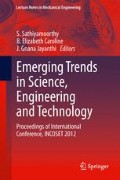Abstract
The intended audience is scheduling practitioners and theoreticians as well as beginners in the field of scheduling. The purpose of this paper is to review the area of parallel machine scheduling (PMS) on issues of complexity. A critical review of the methods employed and applications developed in this relatively new area are presented and notable successes are highlighted. The PMS algorithms are discussed. We have given up-to-date information on polynomially type of problems based on non-preemptive criteria. It is shown that parallel machine makespan-minimization problem is NP-hard even for the two-machine problem. Moreover, the two-machine problem can be solved by the pseudo polynomial algorithm.
Access this chapter
Tax calculation will be finalised at checkout
Purchases are for personal use only
References
Mokotoff E (2001) Parallel machine scheduling problems: a survey. Asia-Pacific J Oper Res 18:193–242
Baker KR, Trietsch D (2009) Principles of sequencing and scheduling. Wiley, New york
Garey MR, Johnson DS (1979) Computers and intractability: a guide to the theory of NP completeness. Freeman, San Francisco
Graham RL, Lawler EL, Lenstra JK, Kan AHGR (1979) Optimization and approximation in deterministic sequencing and scheduling: a survey. Ann Discrete Math 5:287–326
Karp RM (1972) Reducibility among combinatorial problems: complexity of computer computations. Plenum Press, New York, pp 85–103
Lawler EL, Lenstra JK, Kan AHGR, Shmoys DB (1993) Sequencing and scheduling: algorithms and complexity. Handbooks in operations research and management science 4, logistics of production and inventory, North Holland, Amsterdam, pp 445–524
Papadimitriou CH (1994) Computational complexity, Addison-Wesley, Boston
Cheng T, Sin C (1990) A state-of-the-art review of parallel-machine scheduling research. Eur J Oper Res 47:271–292
Filippi C, Romanin-Jacur G (2009) Exact and approximate algorithms for high-multiplicity parallel machine scheduling. J Sched 12:529–541
Levner E (2007) Multiprocessor scheduling: theory and applications. Itech Education and Publishing, Vienna, p 436. ISBN 978-3-902613-02-8
Koulamas C (1993) Total tardiness problem: review and extensions. Oper Res 42:1025–1041
Chen CL (2009) A bottleneck-based heuristic for minimizing makespan in a flexible flow line with unrelated parallel machines. Comput Oper Res 35:3073–3081
Allahverdi A, Gupta JND, Aldowaisan T (1999) A review of scheduling research involving setup considerations. Omega 27:219–239
Potts CN, Kovalyov MY (2000) Scheduling with batching: a review. Eur J Oper Res 120:228–249
Lee H, Guignard M (1996) Hybrid bounding procedure for the workload allocation problem on parallel unrelated machines with setups. J Oper Res Soc 47:1247–1261
Weng MX, Lu J, Ren H (2001) Unrelated parallel machine scheduling with setup consideration and a total weighted completion time objective. Int J Prod Econ 70:215–226
Bruno J, Sethi R (1978) Task sequencing in a batch environment with setup times. Found Control Eng 3:105–117
Behera DK, Laha D (2012) Comparison of heuristics for identical parallel machine scheduling. Adv Mater Res 488–489:1708–1712
Radhakrishnan S, Ventura JA (2000) Simulated annealing for parallel machine scheduling with earliness/tardiness penalties and sequence-dependent set-up times. Int J Prod Res 38:2233–2252
McNaughton R (1959) Scheduling with deadlines and loss function. Manage Sci 6:1–12
Kim DW, Kim KH, Jang W, Frank Chen F (2002) Unrelated parallel machine scheduling with setup times using simulated annealing. Rob Comput Integr Manufact 18:223–231
Koulamas C (1997) Decomposition and hybrid simulated annealing heuristics for the parallel-machine total tardiness problem. Nav Res Logistics 44:105–125
Izakian H, Abraham A, Snášel V Comparison of heuristics for scheduling independent tasks on heterogeneous distributed environments, collected from internet
Armentano VA, Yamashita DS (2000) Tabu search for scheduling on identical parallel machines to minimize mean tardiness. J Intell Manufact 11:453–460
Park MW, Kim YD (1997) Search heuristics for a parallel machine scheduling problem with ready times and due dates. Comput Ind Eng 33:793–796
Li X, Yalaoui F, Amodeo L, Chehade H (2002) Metaheuristics and exact methods to solve a multiobjective parallel machines scheduling problem. J Intell Manuf 23(4):1179–1194
Brucker P, Sotskov YN (2007) Complexity of shop-scheduling problems with fixed number of jobs: a survey. Math Meth Oper Res 65:461–481
Johnson DS, Aragon CR, Mageoch LA, Schevon C (1989) Optimization by simulated annealing: an experimental evaluation; part 1, graph partitioning. Oper Res 37:865–892
Ghirardi M, Potts CN (2005) Makespan minimization for scheduling unrelated parallel machines: a recovering beam search approach. Eur J Oper Res 165(2):457–467
Martello S, Soumis F, Toth P (1997) Exact and approximation algorithms for makespan minimization on unrelated parallel machines. Discrete Appl Math 75:169–188
Allahverdi A, Ng CT, Cheng TCE, Kovalyov MY (2007) A survey of scheduling problems with setup times or costs, Eur J Oper Res
Chen CL, Chen CL (2009) Hybrid metaheuristics for unrelated parallel machine scheduling with sequence-dependent setup times. Int J Adv Manufact Technol 43(1-2):161–169
Tavakkoli-Moghaddam R, Mehdizadeh E (2007) A new ILP model for identical parallel-machine scheduling with family setup times minimizing the total weighted flow time by a genetic algorithm, IJE Transactions a: basics, vol 20(2)
Pinedo ML (2008) Scheduling—theory, algorithms, and systems. Prentice–Hall, Englewood Cliffs
Author information
Authors and Affiliations
Corresponding author
Editor information
Editors and Affiliations
Rights and permissions
Copyright information
© 2012 Springer India
About this paper
Cite this paper
Behera, D.K. (2012). Complexity on Parallel Machine Scheduling: A Review. In: Sathiyamoorthy, S., Caroline, B., Jayanthi, J. (eds) Emerging Trends in Science, Engineering and Technology. Lecture Notes in Mechanical Engineering. Springer, India. https://doi.org/10.1007/978-81-322-1007-8_34
Download citation
DOI: https://doi.org/10.1007/978-81-322-1007-8_34
Published:
Publisher Name: Springer, India
Print ISBN: 978-81-322-1006-1
Online ISBN: 978-81-322-1007-8
eBook Packages: EngineeringEngineering (R0)

